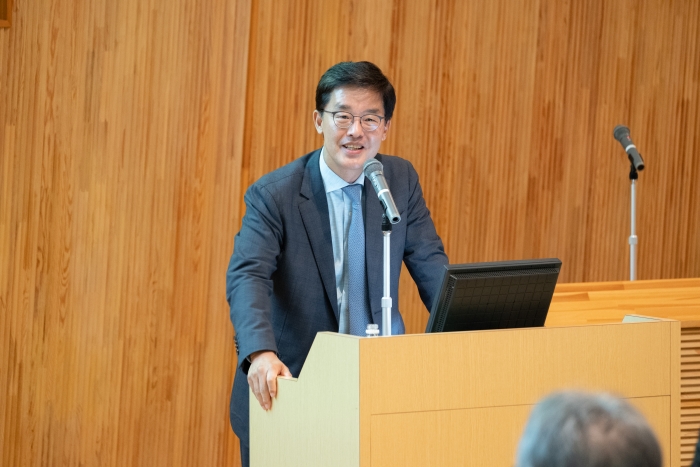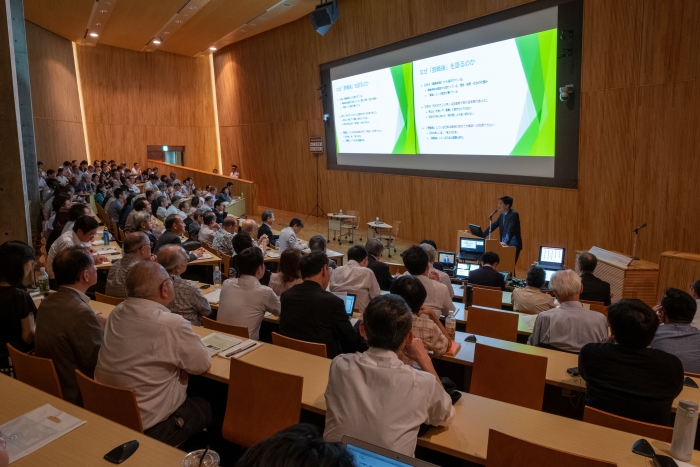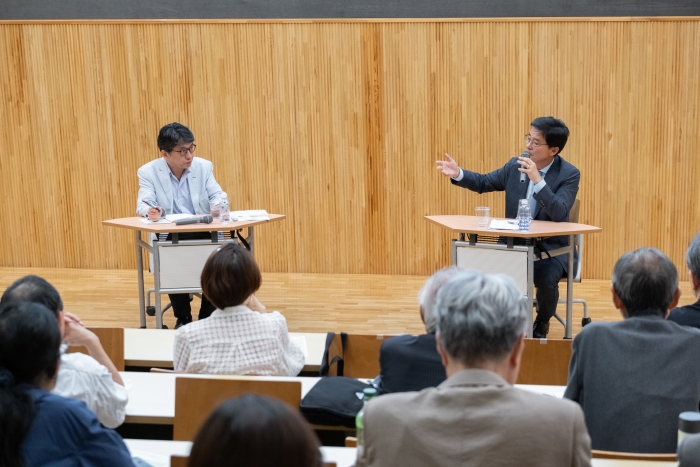Tokyo College Event “Japan That Breaks Away from ‘the Postwar’ ” by Prof. Park Cheol Hee
Professor Cheol Hee Park gave a lecture on “Japan that Breaks Away from ‘the Postwar’.”
On July 22, 2019, Professor Cheol Hee Park (Tokyo College, Graduate School of International Studies at Seoul National University) gave a lecture on “Japan that Breaks Away from ‘the Postwar’.” Professor Park, who specializes in politics and Japanese studies, lectured in Japanese on a form of Japan that is neither a “continuation postwar” nor “a return to prewar,” focusing on a Japan “that breaks away from ‘the postwar’.” In the latter part of the session, Professor Park participated in a dialogue with Professor Shunya Yoshimi (University of Tokyo), who specializes in sociology and cultural studies.

First, Professor Masashi Haneda (College Director) introduced the theme taken up by Tokyo College, “The Earth and Human Society in 2050,” and remarked that Professor Park’s lecture is well-placed to examine “Japan seen from the outside and Japan seen from within.” Professor Park then explained Japan as achieving a break from the postwar in terms of changes to the concepts, systems, and social mechanisms that supported the postwar structure. He then positioned Japan’s lost 20 years as a period of change, and argued that the end of three phenomena in that period—the end of (1) the Cold War, (2) rapid economic growth, and (3) village society—also had a major impact on politics.
Shifting focus from concepts that had supported the postwar structure
Professor Park defined the “breaking away from ‘the postwar’” as “conceptual separation from ‘the postwar’,” and explained that the Liberal Democratic Party, which had an anti-socialist structure in 1955, has now transformed into an anti-liberalism party. He stated that as the trend of anti-liberalism has strengthened, the nature of the debate concerning constitutional reform and historical issues has itself changed. Focusing on the institutional changes seen in Japanese politics in recent years, as well as changes in foreign policy, Professor Park pointed out that recently in Japan the Prime Minister’s authority has become extraordinarily strong (supported by the centralizing system of the Prime Minister’s Office), and that there is an intention to move away from the conservative mainstream of the Yoshida Doctrine, with an emphasis on Japan’s position as a great power in diplomacy and security. He said that the idea has taken root in the direct connection between international security and Japan’s security.

Where is this “Japan that breaks away from ‘the postwar’” headed?
In response to the concern of neighboring countries that Japan might return to its prewar condition, Professor Park stressed that politicians from the postwar generations have a rather different understanding of war and colonies to that of the politicians before them, and stated that, “Japan is now a democratic, rather than imperialist or militarist, country and, above all, it is a country where postmodernism has been well-established by social values, so a return to the old days is almost impossible.” Finally, Professor Park pointed out four issues faced by Japan as it breaks away from the postwar. It has become clear that Japan needs to face the following interrelated issues: (1) the issue of checks and balances on power; (2) the unresolved historical issues; (3) how to maintain the status of a major power as the population shrinks and ages, and the financial burden grows; and (4) how to bring stability to an increasingly stratified and unstable society.

Discussion
After the lecture, there was a discussion between Professor Park and Professor Yoshimi. First, having explained that there are several views about when “postwar” began and ended, and that they all have different interpretations of the postwar concept, Professor Yoshimi suggested deepening the discussion into what “postwar” means in Asia—how the term is understood in mainland China, the Korean Peninsula, and Southeast Asian areas such as Vietnam. He then asked questions concerning the relationship between the political changes and social changes such as aging and the transformation into an internet society; as well as how Japanese politics, economics, and social structures changes during the Heisei era relate to the history of the world as a whole (the turning point of global history), which has changed significantly since the end of the 1970s. In response, Professor Park expressed the view that the postwar period began from 1951 to 1952, and that the postwar regime began to shake from the latter half of the 1980s to the early 1990s. In addition, the dialogue saw spirited discussion relating to the impact of changes in media and mass communication since the 1990s on politics and society.
Coincidentally, the lecture was held the day after the House of Councillors election. Through his analysis of Japanese politics, Professor Park delved into the issues facing Japan today, and set out the tasks ahead without being pessimistic about the future.
Furthermore, the dialogue between a Japanese sociologist and Korean political scientist highlighted how concurrent global events give rise to different political impacts and responses from country to country. On the other hand, it also became apparent that the development of global business, pursuing profit regardless of ethnic or national borders, is an extremely important factor when looking at the future of any country.
| Date(s) | July 22nd (Mon), 2019, 5:00-6:30pm (4:30 pm Doors Open) |
|---|---|
| Venue |
Fukutake Learning Theater, The University of Tokyo (B2 Floor, Fukutake Hall, Hongo Campus) |
| Registration | Pre-registration required (160 seats available -First come, first served) |
| Language | Japanese (Simultaneous translation available) |
| Organized by | Tokyo College, The University of Tokyo |
| Contact | tcevent@graffiti97.co.jp |














